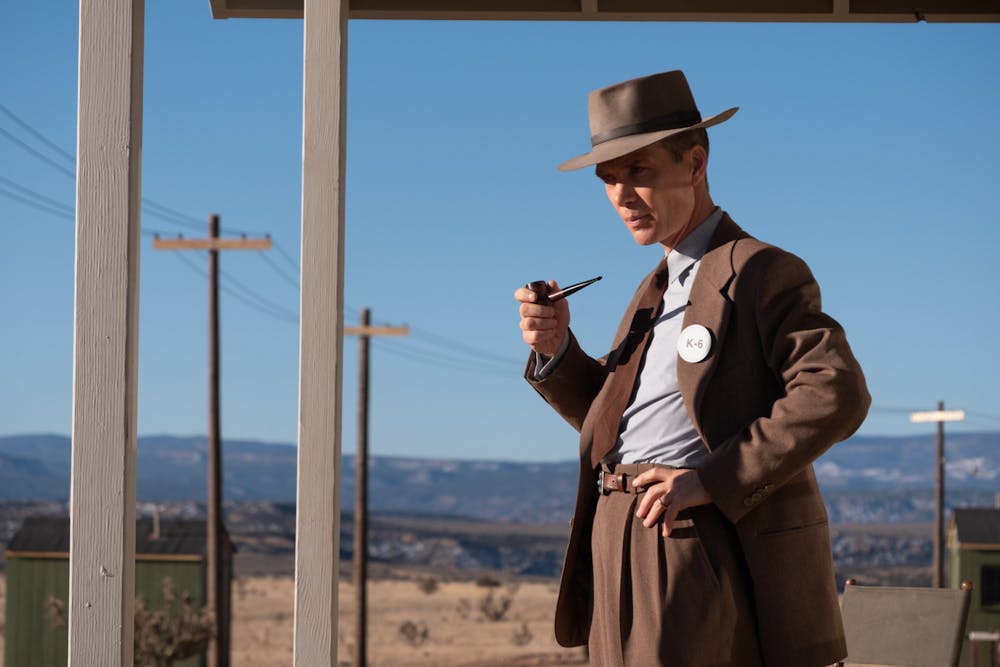Since I saw “Oppenheimer” for the first time, I’ve been trying to piece together my thoughts on the film. But I can’t.
Every time I think about it, my mind goes blank — it’s like the mental equivalent of being presented with something so beautiful you can’t do anything but admire and gawk at it. “Oppenheimer” is basically my Grand Canyon.
Admittedly, this sounds nerdish to an almost embarrassing degree. But I’m of the opinion that people should never feel self-conscious when talking about things they’re passionate about.
I mean this quite literally, without the innocent hyperbole usually found in an excited reviewer’s repertoire — “Oppenheimer” hasn’t left my mind since I saw it on opening night. For three hours, I sat in the biggest theater in Indiana — one of 19 theaters in the nation equipped to play the film in 70mm IMAX — and became enveloped in one of the most technically brilliant and harrowing cinematic spectacles of our time.
The film chronicles Oppenheimer’s involvement in the creation and development of the atomic bomb. Instead of following a linear narrative structure, the film jumps between the past and present; the objective and the subjective; truth and deceit.
The first two hours depict Oppenheimer’s life before and during his time as director of the Manhattan Project, culminating in the climactic Trinity Test sequence, while the third act focuses on a security clearance hearing that is meant to weaken Oppenheimer’s political power and credibility.
He’s put on trial and his left-wing politics and outspoken advocacy against further nuclear developments are questioned. The personal and geo-political consequences of his actions crush him with a cosmic weight. It’s the nuclear fallout of his own doing.
This portion of the film is transformative. “Oppenheimer” goes from being a technically brilliant, standard biopic to something much more mature in its messaging and themes. Oppenheimer repressed the moral implications of nuclear warfare, letting them pressurize deep in his soul until it was too late for him to be absolved of his responsibility. He accepts the outcome of the hearing, hoping that his martyrdom will provide salvation, but it doesn’t. He is forced to live a haunted life, plagued by visions of a nuclear apocalypse.
The film’s ethos is succinctly summarized in one line, delivered brilliantly by Emily Blunt: “You don’t get to commit the sin and have us all feel sorry for you when there are consequences.” This line acts as a condemnation of everything that had been building up until that point; it’s a nihilistic reversal that feels cruel but necessary.
Cillian Murphy’s performance is one for the ages. Few actors are able to carry as much anguish in their facial expressions as him. His eyes — bright as fire — widen with torment, regret, disgust, suffering and so much more. He transforms from an arrogant academic to a shell of a man, a scapegoat for the real warmongers hidden behind closed doors. It’s a visceral, exhausting, and challenging performance — one that will surely be remembered during awards season.
Because “Oppenheimer” is a Christopher Nolan film, it’s a given that the technical aspects are nothing short of remarkable. But Nolan and his team are operating at extremely sophisticated, career-best levels here.
Editing a three-hour epic that follows a non-linear timeline is a behemoth feat, but Jennifer Lame — who previously edited Nolan’s 2020 film “Tenet” — did it masterfully. Her careful cross-cutting between timelines keeps the plot moving forward without seeming tedious. She leaves no room to breathe in conversation scenes, making the urgency of the situation feel all the more alive.
Hoyte Van Hoytema’s cinematography is indescribable. You really have to see it — preferably on the biggest screen you can find — to believe it. In any given scene, Oppenheimer is framed so that it feels like we’re looking at him through a microscope, examining the destruction of a man’s sanity. The depth of focus in scenes that depict Oppenheimer’s hallucinations is imperfect and always shifting, making you feel as disoriented as he is.
There’s a scene in the third act in which Oppenheimer addresses a rally crowd after the bombings of Hiroshima and Nagasaki. The sound design and shot composition in this scene are unconventional and borderline surrealist, which is unexpected coming from Nolan. It’s the most haunting sequence in the whole film, so much so that it almost seems like his first foray into horror filmmaking.
“Oppenheimer” is so many things at once: an intimate character study, a courtroom drama, an existential horror, a political thriller. The final scene unites the film’s ideas and themes symphonically, leaving nothing on the table but a ubiquitous sense of dread, responsibility and wonderment.
It’s a once in a lifetime film. Not just for everyone behind and in front of the camera, but for audiences too. To be able to witness “Oppenheimer” on a screen that’s so big it takes my breath away, to be able to hear the booming, glorious score through speakers that shake me to my core — that's pure, unadulterated movie magic.






